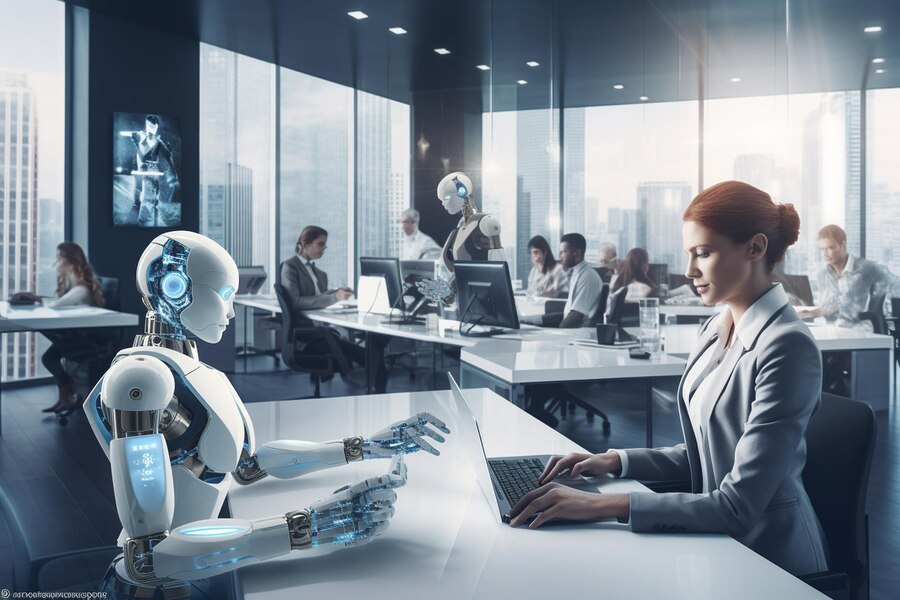
Introduction
Artificial intelligence and automation are reshaping the modern workplace with unprecedented speed. From predictive analytics in finance to generative AI in creative industries, machines are learning to perform not only repetitive labor but also increasingly complex cognitive tasks. This evolution raises a profound question: as algorithms take on more of the work once reserved for humans, what remains distinctively human about the future of work—and how can individuals, organizations, and societies prepare?
Automation and the Redefinition of Work
Automation is not simply replacing jobs—it’s transforming tasks and roles across every sector. Routine, rules-based activities—such as data entry, scheduling, and basic analysis—are increasingly delegated to algorithms and robotic systems. Yet rather than eliminating employment wholesale, this shift is reconfiguring how value is created.
In many industries, the focus is moving from execution to orchestration: humans will design, supervise, and refine automated systems rather than perform the underlying mechanical work. In manufacturing, for instance, technicians manage fleets of autonomous robots instead of assembling parts by hand. In healthcare, AI systems assist in diagnostics, freeing clinicians to focus on patient care. In marketing and media, generative AI produces initial drafts and visuals, while human professionals bring narrative coherence, brand context, and emotional resonance.
The measure of productivity is evolving too. Efficiency—long the primary goal of automation—is being joined by adaptability, creativity, and ethical discernment as key sources of competitive advantage. Organizations that integrate automation effectively are not those that eliminate human roles, but those that amplify human capability through intelligent technology.
What Remains Uniquely Human
As machines grow more capable, it becomes clearer that certain qualities remain difficult—perhaps impossible—for AI to replicate. The workplace of tomorrow will increasingly prize these distinctly human capacities:
- Empathy and Emotional Intelligence: Machines can simulate sentiment, but not feel it. Understanding human nuance—comforting a patient, motivating a colleague, resolving conflict—remains the domain of genuine empathy.
- Creativity and Judgment: AI can remix existing ideas, but true creativity often requires leaps beyond available data. Vision, storytelling, and moral imagination are irreplaceable human strengths.
- Purpose and Meaning: Work is not only about output—it’s about identity and contribution. Humans seek significance in what they do; this drive shapes culture, ethics, and innovation.
The workplace of the future, therefore, will not be a contest between humans and machines, but a collaboration where technology handles precision and scale, while humans provide direction, empathy, and meaning.
Preparing for the Human-AI Partnership
To thrive in this emerging landscape, preparation must extend beyond technical literacy. Mastering coding, data science, or AI tools is important—but insufficient. The coming era demands a whole-person approach that integrates social, ethical, and philosophical understanding.
- Technical Preparedness: Continuous learning is vital. Workers should cultivate digital fluency, analytical thinking, and an openness to experimentation. Understanding how AI systems make decisions—and their limitations—will be as critical as knowing how to use them.
- Social Preparedness: Collaboration across disciplines and cultures will define successful organizations. As automation reduces transactional work, interpersonal and cross-functional skills—communication, negotiation, empathy—will become key differentiators.
- Philosophical Preparedness: The rise of AI invites deeper reflection on what it means to be human. Ethical frameworks, critical thinking, and moral courage will be essential as we navigate questions of fairness, privacy, and accountability in algorithmic systems.
Educational systems, corporate cultures, and public policies must adapt accordingly—balancing technological investment with human development. Lifelong learning programs, emotional intelligence training, and values-based leadership will become central to sustainable progress.
Conclusion
The future workplace will be neither fully automated nor nostalgically human—it will be augmented. AI will continue to reshape industries, but the essence of work will remain rooted in humanity: our capacity for empathy, creativity, and purpose.
In embracing automation wisely, we are not surrendering to machines; we are redefining what it means to contribute, to create, and to care in a connected, intelligent world.
Leave a Reply